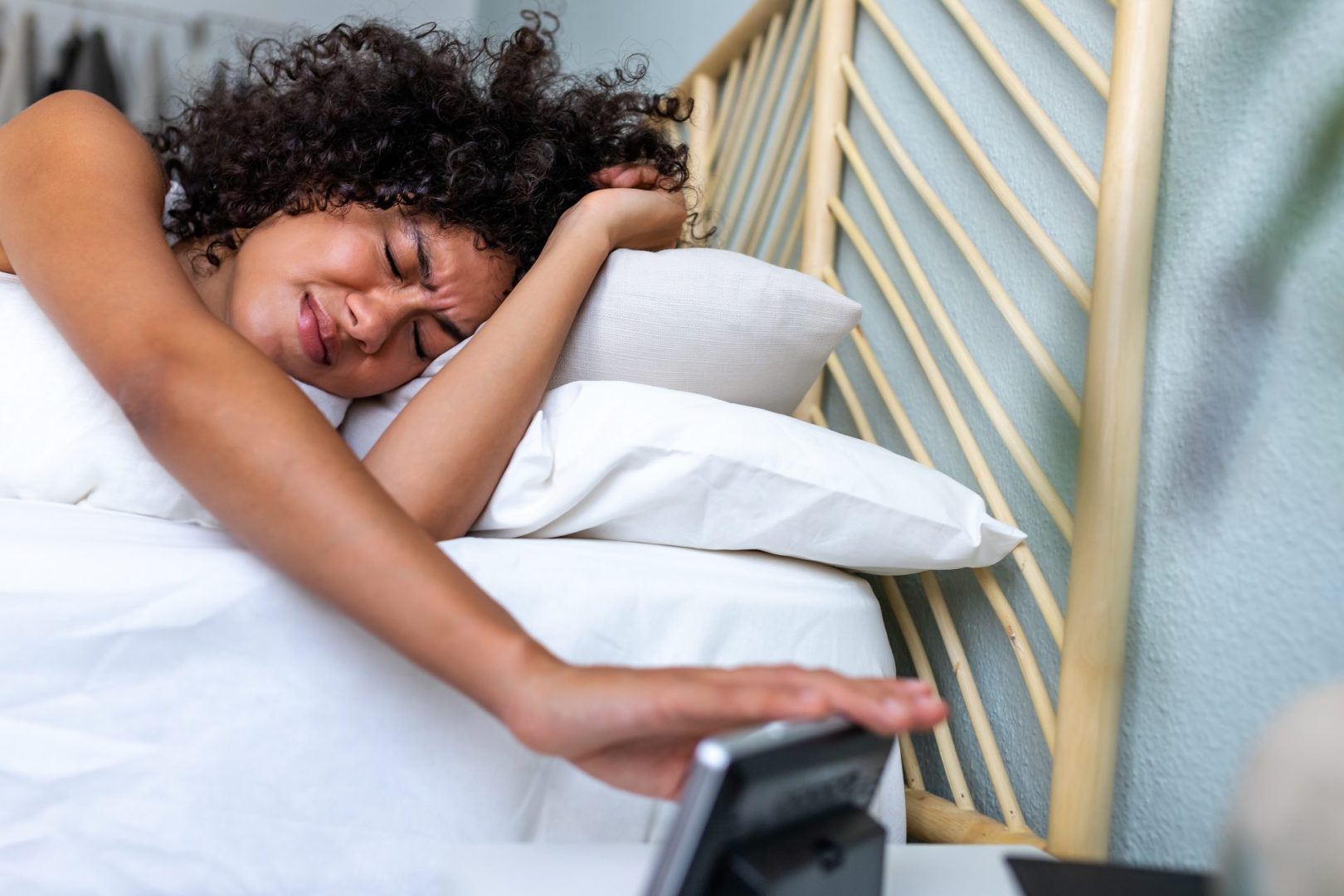That blissful moment when your alarm goes off and you instinctively reach for the snooze button feels like a small victory against the harsh reality of morning. But sleep experts are sounding the alarm about this seemingly innocent habit that millions of people indulge in daily, warning that those extra minutes of rest might be doing more harm than good.
The morning snooze has become so deeply embedded in our culture that alarm clock manufacturers design their products around it, typically offering nine-minute intervals that have become the standard. Yet behind this universal behavior lies a complex web of biological processes that can leave you feeling more exhausted than if you had simply gotten up with your first alarm.
The hidden costs of morning delay tactics
When you hit that snooze button, you’re not just buying yourself a few extra minutes of rest – you’re potentially setting yourself up for a day of decreased energy and mental fog. Sleep specialists have identified several concerning patterns among habitual snoozers that extend far beyond the bedroom.
Many people who rely heavily on snoozing report feeling more tired throughout the day, struggling with concentration, and experiencing what feels like a constant state of jet lag. This isn’t coincidental – it’s the direct result of disrupting your body’s natural wake-up process multiple times each morning.
The practice has become so common that some people build their entire morning schedule around it, setting their alarms significantly earlier than necessary to accommodate multiple snooze sessions. This approach creates a false sense of having “extra time” while actually making the wake-up process more difficult and less refreshing.
What happens inside your body during snooze cycles
Your brain doesn’t treat those extra minutes between alarms as bonus sleep time. Instead, each time you drift off after hitting snooze, your nervous system begins preparing for another full sleep cycle – a process that takes much longer than the typical snooze interval allows.
When the alarm sounds again, you’re often pulled from a deeper sleep stage than when you first woke up, creating increased disorientation and grogginess. This phenomenon explains why many people feel worse after snoozing than they did with their initial wake-up call.
Sleep medicine specialists describe this as putting your body through repeated stress responses. Each time you wake up, your system releases hormones designed to help you transition from sleep to alertness. Multiple wake-ups in quick succession can flood your body with these chemicals, leaving you feeling jittery and tired simultaneously.
The fragmented rest between snoozes lacks the restorative qualities of uninterrupted sleep. Your brain can’t complete important processes like memory consolidation or physical recovery that occur during deeper sleep stages. Instead, you’re stuck in a liminal state between sleeping and waking that provides few benefits.
The psychology behind snooze addiction
Understanding why people become dependent on snoozing reveals deeper issues with sleep satisfaction and morning motivation. Many chronic snoozers report feeling like they need to “ease into” wakefulness gradually, viewing the snooze button as a gentler transition than immediate alertness.
This perceived gentleness is largely illusory. The jarring interruption of multiple alarms actually creates more stress than a single wake-up call, even though it feels more manageable in the moment. The brain interprets repeated awakenings as emergency situations, triggering stress responses that can persist throughout the morning.
Some people use snoozing as a form of procrastination, delaying the start of their day because they feel unprepared or reluctant to face their responsibilities. This emotional component can make breaking the snooze habit particularly challenging, as it requires addressing underlying feelings about daily routines and life satisfaction.
The habit often develops during periods of poor sleep quality, when people genuinely feel they haven’t gotten adequate rest. Unfortunately, snoozing rarely provides the restorative sleep they’re seeking and can actually perpetuate the cycle of poor sleep quality.
How snoozing affects different people
Not everyone experiences snoozing the same way, and certain factors can make some individuals more susceptible to its negative effects. People who naturally prefer later bedtimes and wake-up times often struggle more with morning alarms and may rely more heavily on snoozing to cope with early schedules.
Age plays a role too, with younger adults often showing more tolerance for fragmented sleep patterns while older adults may find snoozing particularly disruptive to their energy levels. Hormonal fluctuations can also influence how disruptive repeated wake-ups feel, with some people experiencing more severe grogginess during certain life phases.
Individual sleep architecture varies significantly, meaning some people naturally cycle through sleep stages faster or slower than others. Those with slower cycles may find snoozing particularly problematic, as they’re more likely to be pulled from deeper sleep during those brief intervals.
Lifestyle factors like stress levels, caffeine consumption, and overall health status can amplify the negative effects of snoozing. People dealing with high stress may find that multiple morning wake-ups increase their anxiety levels and make it harder to start the day feeling calm and centered.
Breaking free from the snooze trap
Eliminating snooze dependency requires a multi-pronged approach that addresses both the practical and psychological aspects of the habit. The most effective strategies focus on making single-alarm wake-ups more appealing while removing the temptation to snooze altogether.
Physical barriers work remarkably well for many people. Placing alarm clocks across the room forces you to get out of bed to turn them off, making the prospect of returning to sleep less attractive. Some find success with alarm apps that require solving puzzles or completing tasks to silence the sound.
Timing optimization can make a dramatic difference in wake-up ease. Rather than setting multiple alarms, focus on identifying your natural sleep cycles and timing your single alarm to coincide with lighter sleep phases. Many people discover they feel more refreshed waking up 15-20 minutes earlier or later than their usual time.
Light exposure immediately upon waking helps signal to your brain that it’s time to be alert. Opening curtains, using bright lights, or investing in sunrise simulation alarm clocks can make the transition from sleep to wakefulness feel more natural and less jarring.
Evening habits that eliminate morning struggles
The foundation of easy mornings is quality nighttime sleep, and addressing evening routines often proves more effective than battling the snooze button each morning. Creating consistent bedtime rituals helps ensure you get restorative sleep that makes waking up feel natural rather than forced.
Temperature regulation plays a crucial role in sleep quality. Keeping bedrooms cool and ensuring you don’t overheat during sleep can prevent the restless, fragmented sleep that makes morning wake-ups feel impossible. Many people find that slightly cooler sleeping environments lead to more refreshing rest.
Avoiding stimulating activities in the hour before bed allows your nervous system to naturally wind down. This includes limiting screen time, avoiding intense conversations or planning sessions, and choosing relaxing activities that signal to your body that sleep time is approaching.
Consistent sleep and wake times, even on weekends, help regulate your internal clock and make morning alertness more automatic. While this might require some social sacrifices, the improved energy levels and mood benefits often make the trade-off worthwhile.
When snoozing signals deeper issues
Chronic reliance on multiple alarms might indicate underlying sleep disorders or health issues that deserve professional attention. People who consistently feel exhausted despite adequate sleep time, regularly sleep through multiple loud alarms, or experience excessive daytime fatigue may benefit from sleep studies or medical evaluations.
Mental health factors like depression, anxiety, or seasonal affective disorder can significantly impact both sleep quality and morning motivation. Addressing these underlying conditions often eliminates compulsive snoozing behavior naturally, as improved mood and energy make waking up feel less daunting.
Lifestyle factors like irregular work schedules, excessive stress, or poor nutrition can also contribute to morning wake-up difficulties. Sometimes breaking the snooze habit requires broader life changes that support better overall health and well-being.
Reclaiming your mornings
The journey away from snooze dependency isn’t just about changing one small habit – it’s about reclaiming control over how you start each day. Many people who successfully eliminate snoozing report feeling more confident, energetic, and in control of their daily routines.
Starting mornings with intention rather than reluctance sets a positive tone that can influence your entire day. Instead of beginning with the stress of multiple alarms and rushed routines, you can create peaceful morning rituals that support your well-being and goals.
The cumulative effects of better mornings extend far beyond just feeling more awake. Improved sleep quality, reduced stress, and greater time management can enhance your overall quality of life in ways that make the initial adjustment period worthwhile.
Your relationship with mornings doesn’t have to be adversarial. With the right approach and patience with yourself during the transition, you can transform your wake-up routine from a daily battle into a smooth, energizing start to each day.














